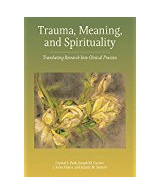“Trauma, Meaning and Spirituality: Translating Research into Clinical Practice”

“Trauma, Meaning and Spirituality: Translating Research into Clinical Practice.”
By Crystal L. Park, Joseph M. Currier, J. Irene Harris and Jeanne M. Slattery
American Psychological Association
Washington, D.C., 2017
Book looks at incorporating spirituality into trauma treatment
Reviewed by Kerry Morrison, Psy.D.
Trauma itself can be experienced as an assault on one’s spirituality or a religious violation for many victims. Many trauma survivors are often “angry at God.” Yet the pervasive roles that spirituality and religion can play in individual’s response to traumatic events and their attempts to cope with them is often overlooked in mainstream trauma treatment.
How spirituality and religion impede or foster resilience in trauma survivors is pivotal to their care and recovery. How the trauma may reshape an individual’s subsequent religious and spiritual lives, as well as impact his/her behavior greatly affects clinical outcomes. The interplay of trauma, spirituality and meaning-making are often ignored in literature, research and clinical practice. These are the reasons why the authors wrote this current volume.
The authors convincingly argue that spirituality and/or religion serve as the foundation of meaning-making systems and are the underpinning of identity, core beliefs and values. This foundation provides a lens through which individuals perceive and interpret their world.
If anything consistently shakes one’s faith and challenges assumptions and worldviews, it’s trauma. Yet the authors opine that maybe the reason spirituality and religion are often absent in treatment approaches for Acute Stress and Posttraumatic Stress Disorders is that many psychologists tend to be far less religious than the average America and other therapists according to an APA survey (2004).
However, most psychologists consider religion to be beneficial. The authors discuss whether psychologists are less inclined to include spirituality in the care of trauma survivors because they are less religious or whether it is because of a lack of formal training.
In APA surveys (2002; 2006), 82 percent of psychologists reported that they did not have any emphasis on spirituality and/or religion in their graduate programs and a quarter of those stated that they did have some conversations about it in supervision.
Whatever the reasoning, this book makes it clear through case examples and research that spirituality needs to be integrated into contemporary trauma informed care in order to enhance clinical outcomes in psychotherapy.
This book is well written, easy to read and offers many salient and culturally diverse case examples in addition to helpful charts, tables and assessment tools. It’s a must have for anyone working with trauma survivors.
Kerry Morrison, Psy.D., is a psychologist for the Department of Developmental Services in the Central/West Region of Mass., who also has a private practice, consults, teaches and provides training on a range of mental health topics.
Learn more about the book: Trauma, Meaning, and Spirituality: Translating Research into Clinical Practice
